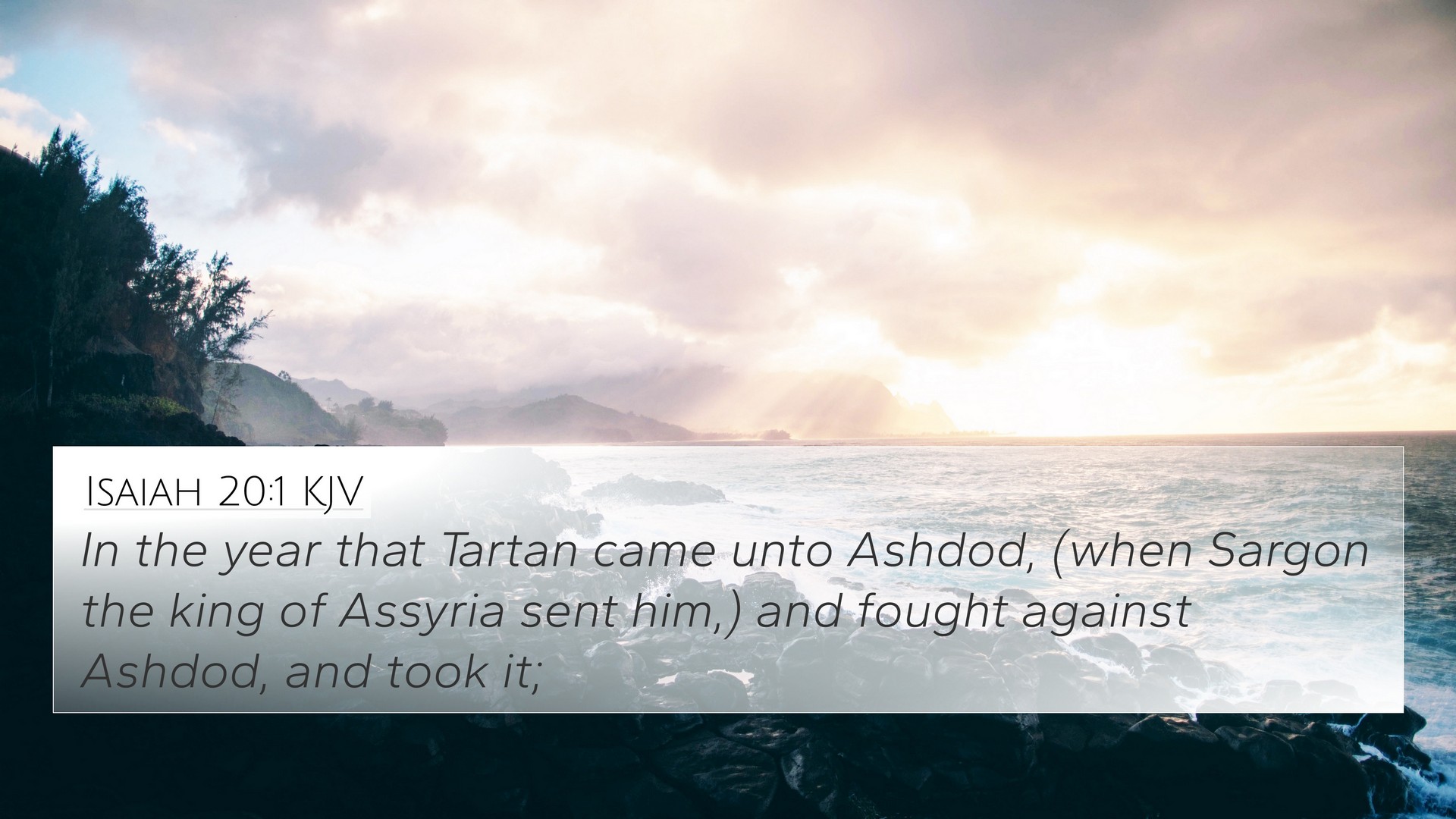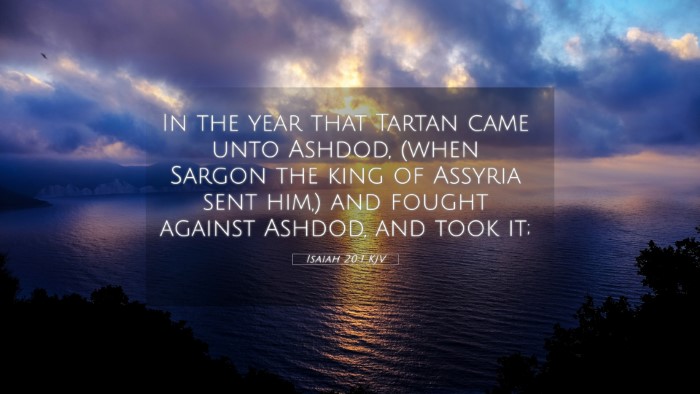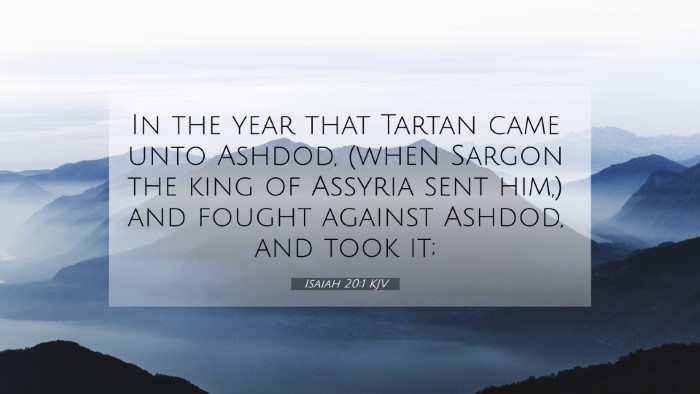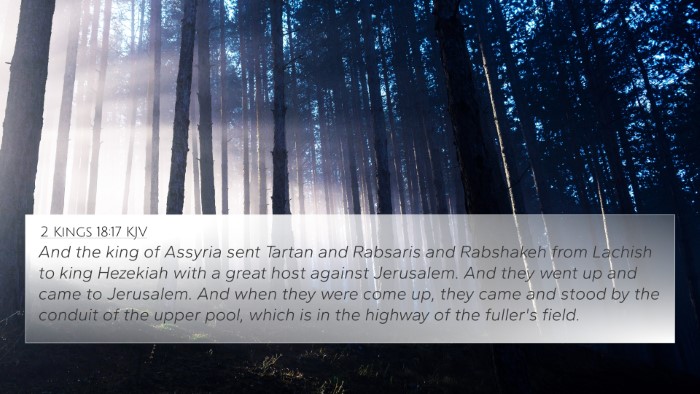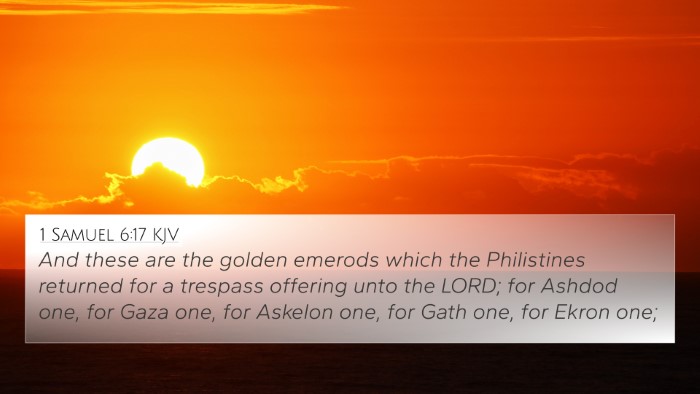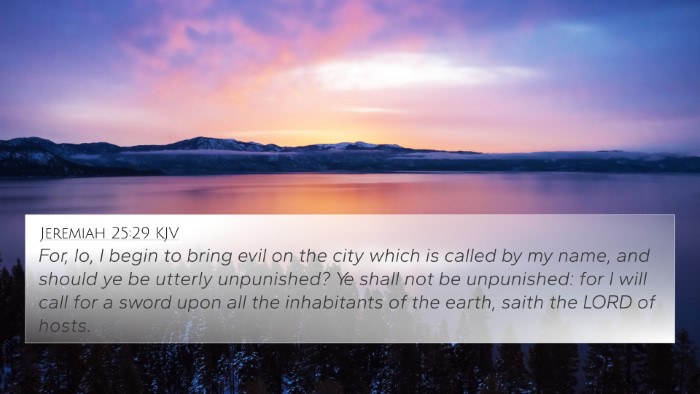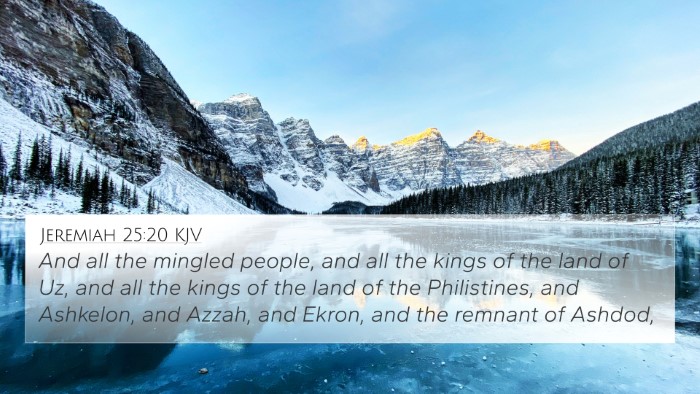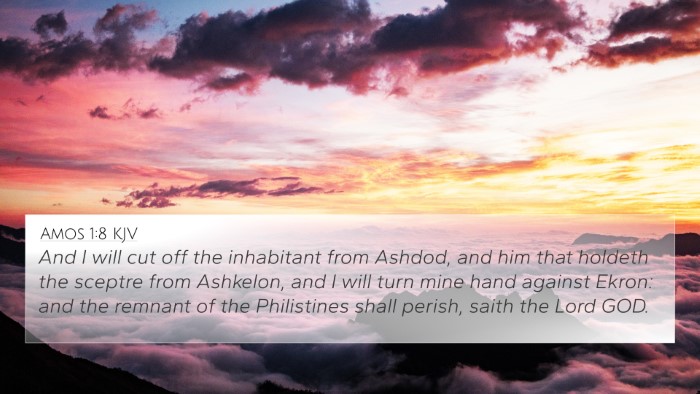Understanding Isaiah 20:1
Verse: Isaiah 20:1 - "In the year that Tartan came unto Ashdod, when Sargon the king of Assyria sent him, and fought against Ashdod, and took it.”
Summary of Isaiah 20:1
This verse marks a significant historical event during the reign of King Sargon of Assyria, focusing on the city of Ashdod, which was besieged and captured by Assyrian forces. The reference to “Tartan” identifies a high-ranking Assyrian official involved in this military campaign. This verse serves as a backdrop for prophetic messages concerning the political upheaval and divine judgment manifesting in the ancient Near East.
Thematic Insights from Public Domain Commentaries
-
Matthew Henry's Commentary:
Henry places this event in the broader context of God using the Assyrian nation to execute judgment upon Israel and surrounding nations. His observations emphasize the sovereign power of God in orchestrating historical events to fulfill divine purposes, highlighting that even enemies may fulfill God’s plans.
-
Albert Barnes' Notes:
Barnes interprets this verse as a factual historical mention that informs readers of the geopolitical landscape of the time. He emphasizes the importance of recognizing the Assyrian threat as part of God's judgment against the Israelites for their idolatry and lack of faithfulness. Barnes also notes the significance of Ashdod as one of the principal Philistine cities, illustrating the corrosive effects of sin leading to divine retribution.
-
Adam Clarke's Commentary:
Clarke expounds on the implications of the Assyrian incursion into Ashdod, analyzing the political dynamics of the ancient Near East. He asserts that this event not only reflects military might but also serves as an allegory of spiritual struggle, urging believers to be aware of the consequences of turning from God. Clarke’s analysis provokes thought about the moral lessons inherent in historical occurrences.
Historical Context
The year referred to here is significant, situating itself in a tumultuous period for the kingdom of Judah and the surrounding regions. The victory of Sargon over Ashdod illustrates the shifting power dynamics in the ancient world, underscoring the Assyrian Empire's dominance and the resulting prophetic admonitions directed at God's people.
Cross-References
Isaiah 20:1 can be cross-referenced with the following Bible verses for deeper understanding and thematic connections:
- 2 Kings 18:19-20 - Discusses the Assyrian threat to Jerusalem, establishing the context of fear and conflict.
- Isaiah 14:24-25 - God's plan against the Assyrians, showing that their might is ultimately under divine control.
- Isaiah 10:5-6 - Prophecies regarding Assyria as an instrument of God's judgement.
- Jeremiah 47:1 - Indicates a similar prophetic warning related to nations bordering Israel and their impending doom.
- Micah 5:5 - Speaks of Assyria as a looming threat, reinforcing Israel's position in a divine plan.
- Isaiah 21:1-10 - Additional prophecies about judgment on nations, further deepening the themes of divine intervention.
- Isaiah 19:23-25 - Highlights the relationship and future reconciliation between Egypt and Assyria, emphasizing God's overarching providence.
- Isaiah 8:8 - Refers to the swift advances of Assyria, which parallels the invasion of Ashdod.
- Isaiah 7:1 - Discusses political intrigue and alliances during a similar historical moment.
- Habakkuk 1:6 - A poignant reference to Babylon and can be compared for understanding the role of empires in God's plans.
Applications of Cross-Referencing
By engaging in scriptural cross-referencing of Isaiah 20:1, one can uncover deeper biblical themes, including:
- God’s Sovereignty: Understanding how God uses nations for His purposes, demonstrated through various biblical texts.
- Judgment and Mercy: Observing how God warns His people throughout scripture while also providing avenues for redemption.
- Historical Prophecies: Analyzing how the historical narrative informs interpretative frameworks for contemporary faith challenges.
- Faith in Times of Crisis: Exploring both the messages of hope and judgment can encourage a vigilant and faithful lifestyle.
- Interconnectedness of Scripture: Recognizing the elaborate weaving of prophetic texts and their fulfillments across the Bible.
Conclusion
Isaiah 20:1 serves as a pivotal point in understanding the ancient geopolitical landscape and the profound theological principles underpinning it. The links to other biblical verses enrich our interpretation, reinforce the overarching narrative of divine justice and mercy, and underscore the sovereignty of God throughout history.
Further Study
- Utilizing tools for Bible cross-referencing can enhance individual study and sermon preparation.
- Engagement with a Bible concordance provides insights into specific words and their occurrences across scripture.
- Exploring methods of cross-referencing Bible study can deepen understanding of complex themes.
- Consider employing a Bible cross-reference guide for a systematic approach to exploring interconnected verses.
